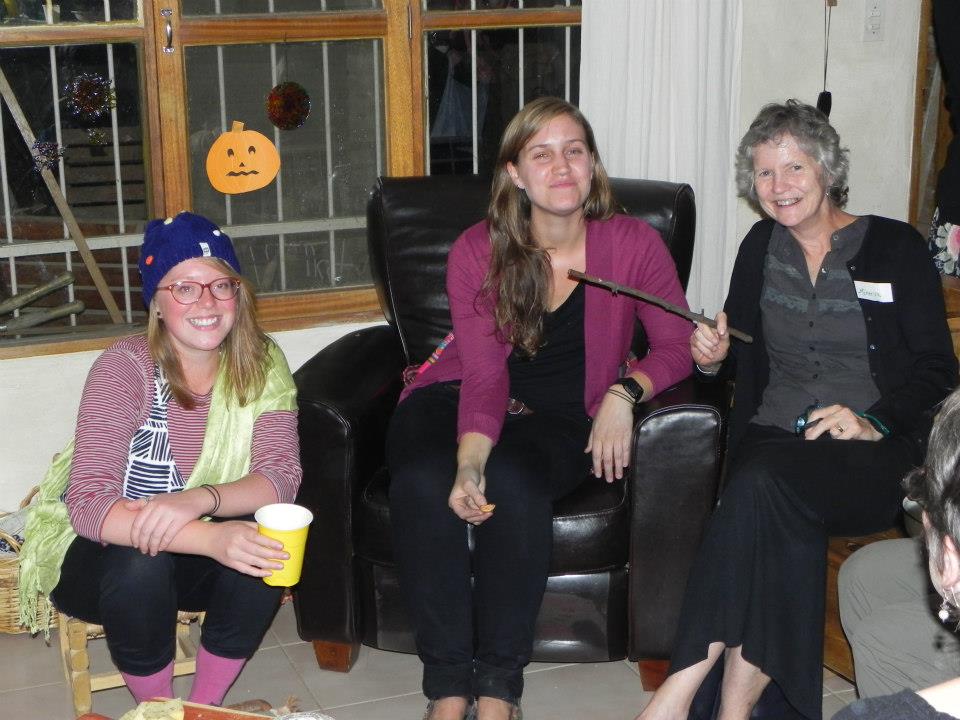October 31st:
We did celebrate Halloween in Bolivia. We celebrated with Dan and Rocio Moriarty at there home. Every year, they invite US families (both missionary and non-missionary) with children who are living in the Cochabamba area. It's a cool way to celebrate Halloween in a way that respects that Halloween is not a tradition in Bolivia (and is actually a privileged holiday here, clearly dividing social classes). Instead of visiting houses in the neighborhood, we celebrated inside the house. The kids trick-or-treated from front door to back door and room to room. Sarah says that when she lived in Venezuela, she too trick-or-treated in this fashion.
Here are some photos from the fun night:
 |
| I was Ginny Weasley dressed as a muggle, Sarah as Katniss Evergreen, and Kathy as Profa. McGonagall |
 |
| A great photo of the kids and Kathy and Bill Collins...many Harry Potter themed |
 |
| Sarah giving candy from a bedroom to the little trick-or-treaters |
“Hello darkness, my old friend
I've come to talk with you again
Because a vision softly creeping
Left its seeds while I was sleeping
And the vision that was planted in my brain
Still remains
Within the sound of silence…” – S&G
I've come to talk with you again
Because a vision softly creeping
Left its seeds while I was sleeping
And the vision that was planted in my brain
Still remains
Within the sound of silence…” – S&G
These were the words ringing through my head as my host
family guided me around the HUGE cemetery in Cochabamba. The notes of the
famous Simon and Garfunkel played by local trumpeter filled the empty spaces in
conversation and accompanied grievers during the Dia de los Difuntos (Day of
the Dead) celebration. In reality, I may have been one of the only people
thinking of Simon and Garfunkel. In Bolivia, the same tune of the “Sound of
Silence” is used in order to sing the Padre Nuestro (the Our Father prayer).
The end of October passed without the overwhelming commercialization
of costumes and candy, ghosts and ghouls. Instead, families spent time
preparing tables, buying breads, making food and lighting candles to pay
tribute to family members who have passed away.
The mast’ku, a Quechua word, refers to the table set with
favorite foods and drinks of the deceased family member(s). If the death was
more recent (within the last year or, even two) the table is much more
elaborate. However, no matter how much time has passed, a table is always set,
even with just bread, a piece of fruit and a glass of water.
 |
| Breads and treats at the market |
 |
| T'anta Wawas (bread babies) |
 |
| Here is table set up outside of the local cemetary |
What is beautiful about this holiday is its focus on the
celebration of life and the idea of community. Within a 24 hour period, the
spirits of the deceased visit earth (between noon on November 1st
until noon on November 2nd), spend time with the family, eat the
food (taking the essence of the food) and then return to the spiritual word.
This celebration is important to remember the balance of life. .
The food, then, is not wasted. People, mostly children, pray
for their deceased loved ones. Then, they receive some of the food from the
table.
So, during this celebration, Sarah and I had the opportunity
to stay with Jim and Karen Weaver at their home in the Zona Sur (known as the
more impoverished area of town). Jim and Karen are Maryknoll lay missioners who
were in the same class as Mary Jo and Phil 18 years ago (Sarah’s parents). They
have lived in Cochabamba for the last two years working with the parish,
outreach programs, and one of the Fe y Alegria schools in the Zona Sur. They
have three children, all bilingual, and many, many animals (mostly rabbits,
which they raise to eat).
Sarah, two other volunteers, and myself were invited to
their home to celebrate Dia de los Santos and experience the tradition of going
from house to house, praying with families who have lost family members. We
only visited one house, put it was so incredible to see their mesa (table) with
all of the urku (bread), t’anta wawas (bread shaped like humans to represent
the deceased), and other foods that the deceased enjoyed to eat!
Going to their house was such a wake-up call. I have been so
privileged thus far in Bolivia. Visiting Jim and Karen presented another reality
of other families here in Bolivia. This family lives simply, intentionally, in
solidarity with their neighbors. I felt soo filled with the rich spirit
visiting their home and community. How profound it was to be so satisfied
without the excess of material possession. As an American citizen, a girl
raised in a tourist destination, who has seen and experienced a privileged
lifestyle, I find that these reality checks are so cleansing and rejuvenating
for my spirit.
Simple living is more than just a sacrifice of material wealth;
there is large spiritual/relational component. I am still growing in my journey
of understanding this balance; therefore, this conversation has just begun.
I look forward to continue this conversation on what it
means to live simply.



